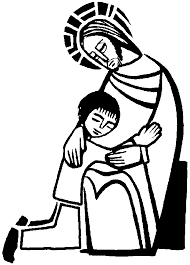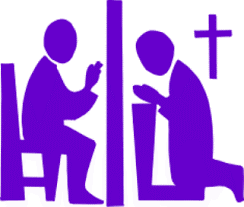Reconciliation Page
Reconciliation

Jesus entrusted the ministry of reconciliation to the Church. The Sacrament of Penance is God's gift to us so that any sin committed after Baptism can be forgiven. In confession, we have the opportunity to repent and recover the grace of friendship with God. It is a holy moment in which we place ourselves in his presence and honestly acknowledge our sins, especially mortal sins. With absolution, we are reconciled to God and the Church. The Sacrament helps us stay close to the truth that we cannot live without God. "In him, we live and move and have our being" (Acts 17:28).
The essential elements of the sacrament of Reconciliation are two: the acts of the penitent who comes to repentance through the action of the Holy Spirit, and the absolution of the priest who in the name of Christ grants forgiveness and determines the ways of making satisfaction.
Examination of Conscience
Before going to Confession, you should make a review of mortal and venial sins since your last sacramental confession and should express sorrow for sins, hatred for sins, and a firm resolution not to sin again.
A helpful pattern for examination of conscience is to review the Commandments of God and the Precepts of the Church:
- Have God and the pursuit of sanctity in Christ been the goal of my life?
- Have I denied my faith? Have I placed my trust in false teachings or substitutes for God? Did I despair of God’s mercy?
- Have I avoided the profane use of God’s name in my speech? Have I broken a solemn vow or promise?
- Have I honored every Sunday by avoiding unnecessary work, celebrating the Mass (also holydays)? Was I inattentive at, or unnecessarily late for Mass, or did I leave early? Have I neglected prayer for a long time?
- Have I shown Christ-like respect to parents, spouses, and family members, legitimate authorities? Have I been attentive to the religious education and formation of my children?
- Have I cared for the bodily health and safety of myself and all others? Did I abuse drugs or alcohol? Have I supported in any way abortion, “mercy killing,” or suicide?
- Was I impatient, angry, envious, proud, jealous, revengeful, and lazy? Have I forgiven others? Have I been just in my responsibilities to employer and employees? Have I discriminated against others because of race or other reasons?
- Have I been chaste in thought and word? Have I used sex only within marriage and while open to procreating life? Have I given myself sexual gratification? Did I deliberately look at impure TV, pictures, reading?
- Have I stolen anything from another, from my employer, from the government? If so, am I ready to repay it? Did I fulfill my contracts? Did I rashly gamble, depriving my family of necessities?
- Have I spoken ill of any other person? Have I always told the truth? Have I kept secrets and confidences?
- Have I permitted sexual thoughts about someone to whom I am not married?
- Have I desired what belongs to other people? Have I wished ill on another?
- Have I been faithful to sacramental living (Holy Communion and Penance)?
- Have I helped make my parish community stronger and holier? Have I contributed to the support of the Church?
- Have I done penance by abstaining and fasting on obligatory days? Have I fasted before receiving communion?
- Have I been mindful of the poor? Do I accept God’s will for me?
During Confession


After examining your conscience and telling God of your sorrow, go into the confessional. You may kneel at the screen or sit to talk face-to-face with the priest.
Begin your confession with the sign of the cross, “In the name of the Father, and of the Son, and of the Holy Spirit. My last confession was _________ weeks (months, years) ago.”
The priest may read a passage from Holy Scripture.
Say the sins that you remember. Start with the one(s) that is most difficult to say. (In order to make a good confession the faithful must confess all mortal sins, according to kind and number.) After confessing all the sins, you remember since your last good confession, you may conclude by saying, “I am sorry for these and all the sins of my past life.
Listen to the words of the priest. He will assign you some penance. Doing the penance will diminish the temporal punishment due to sins already forgiven. When invited, express some prayer of sorrow or Act of Contrition

